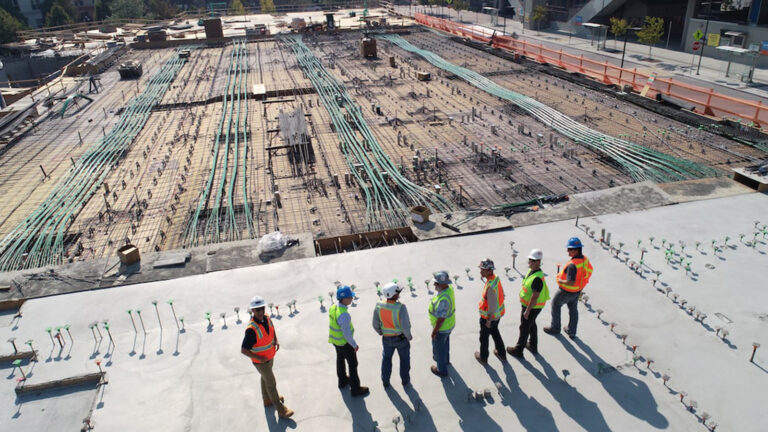
Construction industry is heavily reliant on effective management and strategic planning to ensure successful projects. The way a business operates in the construction sector provides the necessary foundation for any project’s success. Every step taken from its initial conception through completion needs to be meticulously thought out if it aims at achieving positive results. We want this blog post to help you understand how proper operations within construction can give your project that edge of greatness that will inevitably lead towards success! See what impact well-executed managerial plans and strategies have, unlocking secrets which guarantee successful outcomes with every endeavor!
Understanding Construction Management and its Impact on Projects
Managing construction projects is full of challenges and intricacies. The planning, financing, and timing are only some of the elements to take into consideration when managing any venture in this business. Despite careful preparation though things can still go wrong if you don’t properly manage operations; that’s why it’s critical for those involved in building to understand how pertinent successful management really is for a project’s success. How could mismanagement get worse? What would be lost without proper oversight?
Construction management involves using both technical skills and business knowledge to help companies handle complex projects while ensuring that every element is implemented properly. It requires an understanding of the various building systems from creating a foundation right through to completing finishing touches, as well as having insight into how all these components can impact scheduling, budgeting, cost control, safety management or assurance quality control and risk reduction. Construction managers must also be in close contact with architects, engineers or other partners throughout any given project so they guarantee success on each separate part before completion.
By taking an organized approach towards managing operations within the construction industry it’s possible for businesses to foresee potential risks before they arise , whilst optimizing their resources across all factors connected with any individual undertaking- ranging from labor costs up until materials procurement – resulting in superior performance at reduced expenses which ultimately leads them more profits when managed efficiently .
The Role of Business Operations in Construction Industry
These days, business operations in the construction industry are more important than ever. It’s no longer enough just to get projects done – they have to be on time and within budget too! To achieve this goal, companies must create an effective strategy for managing resources and handling project objectives. This requires a thorough understanding of both the project itself as well as how it should be managed effectively from start to finish. When planned out properly with attention paid towards every detail, businesses can ensure their construction projects go according to plan without any delays or overspending costs.
Analyzing the scope of work for each stage of a project is essential when it comes to developing an effective business operations strategy. When doing so, you can identify which resources should be allocated and how much time needs to be spent on completing each task. Furthermore, clearly defining roles ensures that all involved understand precisely what they are responsible for from start to finish in terms of the project’s duration. Questions like “who will handle this?” or “what additional skills might need?”, help give clarity about expectations within the role–this provides everyone with direction throughout and makes sure no one is left confused or overburdened during its execution.
Making sure that everyone is aware of their roles in the process makes it much easier for everything to run smoothly. Once those responsibilities are established and everybody knows what they need to do, then it’s time to keep tabs on how things are progressing. This includes keeping close track of labor costs alongside material expenses so nothing goes over budget – plus getting regular reviews done as different stages progress so any issues can be spotted before they become significant problems later.
Creating systems like these will make sure that completing tasks is successful and efficiency within the company’s business operations processes grows. It’s also worth noting how crucial communication is for managing construction businesses’ procedures effectively – poor or no communication among those taking part in a project could lead to misunderstandings, miscommunication, costly setbacks and errors being made further down the line. How can all parties involved ensure clear lines of dialogue?
Making sure everyone knows what needs to be done and when is an important part of streamlining workflow. This helps keep people accountable for their actions, leading towards greater success. Additionally, having efficient monitoring systems in place can help catch potential issues before they become more serious – this could lead to costs savings on both labor hours and materials used down the line.
To ensure everything runs smoothly it’s key to stay organized with tools like Gantt Charts, calendars, schedules etc.. These will provide a timeline so tasks are given out accordingly which allows teams get more done faster while still maintaining quality across all stages; staying ahead rather than behind means fewer hiccups during construction resulting in higher client satisfaction levels and less delays overall .
Linking Project Success to Effective Business Operations
Managing business operations in the construction industry can be intimidating for sure. It’s definitely not an easy task to plan, manage and execute all the tasks that come with any building project. But if done properly, it is possible to bring projects under successful completion using effective management of operational activities; which are usually either taken lightly or neglected altogether when planning a venture within this sector. To make things right here, one must first comprehend what constitutes efficient operation-related administration within this particular arena.
An intensive evaluation of current procedures should be conducted to figure out which zones need updating or re-consideration – ranging from financial planing and booking to assets assignment and hazard counteraction approaches. Subsequent to distinguishing the appropriate changes, they ought to be executed quickly for utmost effectiveness and yield increases. How will these alterations have an effect on our daily operation? Will there be any major modifications in how we work? Do we also require additional personnel or resources? Getting timely answers can make a difference between effective implementation and failure when it comes progressing further with the project at hand!
It’s essential to have solid organizational structure for teams. Making sure that each team member knows their duties and responsibilities will guarantee everyone is held accountable for their work performance. Planning out your project carefully can save time, money, and even potential issues down the road – consider factors such as budget limits, timeline goals, expected results etc., when coming up with strategies in advance. This way you won’t be unpleasantly surprised by any surprises later on!
Having good operational management, along with strategic planning for your construction project will ensure it meets its goals. It requires dedication and foresight from those involved in order to make sure all goes as planned. Now that you have the knowledge, there’s no reason not to get started on improving your projects! Planning ahead allows everyone working on a project to stay organized while making room for changes when needed without throwing off progress too much; implementing quality control also helps keep track of any issues during development stages which may otherwise increase costs due unexpected complications. Asking yourself questions like ‘Am I properly prepped?’, ‘What could go wrong?’ or ‘How can this be improved?’ throughout every phase of the process is key – something that holds true across many areas of business operations outside just construction work too!
Strategic Planning: A Game-changer for Construction Businesses
It’s clear that the construction industry is no walk in the park. With so many people involved, having to meet tight deadlines and managing hefty budgets, there’s hardly any margin for error when it comes to running operations smoothly. Project success or failure can be largely determined by the quality of business management practices that are put into place – from procuring materials to financial forecasting. Sadly though, quite a few folks within this sector don’t comprehend how critical developing plans ahead of time really is when aiming towards successful constructions sites!
Strategic planning is of utmost importance for any organization that wants to have a steady rise in their domain; this also holds true when it comes to the construction companies. By forming an extensive plan with achievable targets, businesses are able guarantee they’re making intelligent decisions and devoting resources where there will be greatest influence on their activities. For instance recognizing important areas such as cost reduction approaches, danger management plans and competent resource usage schemes – all whilst keeping track of long-term objectives like getting more income or extending market share?
Utilizing strategic planning techniques for business operations in construction projects can help organizations stay ahead of potential delays or obstacles before they arise. Applying this method correctly by personnel who are knowledgeable about both the technical elements and financial impacts related to each project stage – from design all the way through completion – could be truly transformative when it comes to budget optimization and timely delivery results. But how exactly should a company go about implementing such an approach? It is essential that those responsible for managing and carrying out these efforts have specialized knowledge so as not to leave any stone unturned, ensuring success at every juncture!
Putting the right pieces together is critical for businesses to be successful. Effective management plus sound strategic planning equals success in any industry, but especially so in construction. Strategic planning at each stage of development – from design through completion – can make all the difference between a positive outcome or not. Taking time to train staff on how best to use these methods will lead your organization into greater profitability as risks decrease, costs optimize and productivity skyrockets! If you haven’t considered implementing these practices yet, now may be the ideal time – who knows what amazing results could arise?
Insight into Successful Project Transformation in Construction
Navigating the construction industry can be tricky, since it involves many processes that need specialized knowledge and expertise. Performance of a project is linked to its ability to handle time, cost, scope and quality within an integrated system. To turn projects into successful endeavors you have to understand business operation principles that support successful completion of such projects in this field. Business operations are always behind development and exercise all operational activities needed for getting good results with a specific construction job. Without them success would not be possible – so they play quite significant part! Have you ever thought about what’s really essential when it comes to running any kind of building project?
When it comes to the success of any project, there’s a lot that needs to be taken into consideration. Everything from budgeting and scheduling to planning and staffing – these are all necessary elements for ensuring a positive outcome in whatever endeavor is undertaken. Through utilizing effective business operations techniques within their organizations, companies can greatly increase their chances of achieving great results with each new venture they pursue! This could mean anything from figuring out ways of procuring resources efficiently or managing risk more effectively; no matter which direction your team takes, making sure you’ve got the right tools in place will help make those dreams become reality. So why not take advantage today? When it comes to business operations in construction, there are many key components that must be considered. First off, a sound organizational structure needs to be created and processes should be implemented systematically. Protocols need to set up as well for employees so everyone is on the same page when performing their job duties. In addition, materials and services will have to purchased while budgets should also been established and schedules managed accordingly too – all of which affects risk management related tasks or activities associated with each project stage at hand. Contracts between parties involved in any particular transaction or activity linked with completion of said project may also need managing from time-to-time; especially progress towards meeting objectives specified by ownership stakeholders who take part in such matters ought not go under looked either! Last but not least performance metrics analysis touching upon various elements relevant completing whatever task/activity one might come across are absolutely essential too – no matter how small they seem initially!
No doubt, having robust business operations policies in place is key to ensuring your organisation’s projects have better chances of success! Establishing protocols ahead-of-time helps everyone involved understand what needs to be done when – eliminating confusion and guesswork if things don’t go as expected. Furthermore, detailed plans and strategies are important for minimising potential risks while capitalizing on available resources with the goal of achieving improved outcomes over time. When implemented correctly these systems can give invaluable insights into how best approach future tasks thus contributing towards boosting a company’s performance long term too! It really pays off thinking through such considerations before taking on any new venture; otherwise it may prove tricky or even impossible for managers and executives alike to anticipate possible issues which might crop up during execution stages due unforeseen events or weather delays. All that considered, having effective operational procedures in place goes a long way towards making sure everything runs smoothly & according plan every single time – so always make sure you take them seriously!
Key Strategies for Improving Business Operations in Construction
Successful construction projects can be a make or break. Construction companies need to employ effective strategies and proactive planning for their project’s success, this involves everything from budgeting all the way through risk management as well as safety protocols. It is essential that those involved in a construction business ranging from owners, managers and subcontractors right down to laborers have an understanding of how good operations take care of performance and profitability within the company too! An imperative tactic for improving businesses operation in building would be cost estimation. By predicting costs accurately using methods like detailed breakdowns you can get insight into what needs spending on most without blowing your entire budget – which could potentially lead your whole venture off track if not supervised correctly.
Knowing the costs associated with a particular project is essential for accurate budgeting, scheduling, resource procurement, project tracking and more. To get it right first time round you have to be as precise as possible when estimating your expenses – this helps prevent any potential issues or problems from arising before they actually do. It’s also worth considering using software programs that are designed specifically for cost estimation in order to guarantee accuracy throughout every stage. And if you really want to boost productivity within your construction operations then risk management planning should definitely be at the top of your agenda! This ensures all risks involved in projects can be identified early on so suitable precautionary measures can easily put into place — making it much easier stick close those budgets!
It is essential that any construction company should always keep in mind the potential risks associated with every project they take on. These include physical threats to safety, like accidents or environmental hazards, as well as financial dangers such as delays caused by changed regulations or running out of materials. To prevent these issues from happening and causing trouble down the line, it’s important for companies to do their research ahead of time and make sure they have plans ready in case something unexpected arises. This could involve seeking advice from professionals specialized in risk assessment or establishing contingency plans if needed – taking pre-emptive measures is key!
Creating a risk management plan is important in any project. It should clearly outline protocols to ensure safety measures are kept up at all times, both to protect workers and avoid possible legal issues later on due negligence of anyone working with the job site. Businesses must also be thoughtful when making decisions involving their workforce; it’s key not just for labor relations but also overall success of the company. When you look at these things together, it can help prevent costly lawsuits or other problems in future that could arise from an incident now if proper care isn’t taken today.
The relationship between employers and employees is crucial for the successful completion of tasks such as following instructions, completing paperwork, meeting deadlines etc. When an employee feels respected by their supervisor they are more likely to stick to the rules set forth by them which leads to better results overall. Establishing strong ties among all involved will help build trust in a company while allowing tasks to be done efficiently without compromising quality standards.
Overall, there numerous steps that businesses should take into consideration when aiming at optimising operations within construction projects – from cost estimation budgeting risk management labor relations – if applied correctly these procedures can allow companies gain optimal profit whilst guaranteeing high-quality outcomes on every job!
How a Strong Operational Strategy Ensures Project Success
Running a successful construction business is vital for any project’s success. Without proper management, the chances of achieving your desired results are slim. To ensure you get the most out of each job and to guarantee quality workmanship, it pays off to develop an operational strategy that covers all aspects of business operations such as planning & scheduling tasks; assigning resources; keeping costs in check etc.
Having a good plan should always start with setting clear objectives which are tailored specifically for every single assignment so they can be met successfully. Afterall – without being aware about what needs to be achieved how would one know when done?
Once the goals have been established, they can be used as a building block for creating an effective plan of action that will guarantee success throughout each stage of the project’s growth. This tactic should be highly exact, with precise directions on how every step in the procedure needs to be finished and by when it has to get done so everything remains consistent. To add to this, making sure there is free flow communication between any stakeholders involved is also essential; if everyone’s not aware of what tasks need doing and their expected deadlines then mistakes or delays are more likely! So why take chances? Get everybody up-to-date right away – you’ll thank yourself later.
Creating a timeline that’s well-defined is key to ensuring tasks are finished on budget and in time. This helps keep projects running smoothly, without any unwelcome delays or hiccups along the way. Good organizational skills also play an important role when it comes to successful completion of construction projects – from understanding what resources you have available through allocating them accordingly and efficiently so they’re used where needed most. Do you need help with resource management?
Using software like project management tools and ERP solutions, construction businesses can monitor their resources and how they are used at each stage of the projects. This enables them to make informed decisions about using these resources in a way that keeps everyone productive without needing extra personnel or equipment later on which saves time and money when compared with traditional methods . Creating an optimal operational strategy requires input from executives as well as frontline workers. Doing this will give companies peace of mind knowing that their projects have been built for success right away by managing operations accurately while still meeting client budgets & deadlines, resulting in higher customer satisfaction rates leading further retention rate & higher profitability down the line.
Case Study Analysis: When Good Operations Drive Great Projects
Business operations are the foundation of any construction project. They make sure that all elements in the endeavor align, from budgeting and material procurement to labor and supervision. When this is done right, it can have a big impact on your whole business venture – but what do you need to guarantee proper performance? A case study analysis can be an effective way of finding out how good management and strategic planning with business operations will change up your projects for the better! It’s like exploring different strategies to figure out which works best for you; taking an objective look at what has already been done successfully so as not to reinvent the wheel. Plus, looking into other companies’ successes or failures allows us insight into their processes – giving ourselves knowledge about how we should handle our own situation too!
Taking a closer look at real-life scenarios can help you get an idea of how certain methods have yielded positive results, and also determine what areas could be improved upon in your own organization or business. For example, one case study analysis highlighted the successful management of business operations during a major infrastructure project with limited resources. This was achieved by ensuring all stakeholders stayed informed every step along the way; employing data-driven analyses to figure out cost allocations more effectively; as well as providing prompt feedback on progress reports so any issues would be addressed immediately before they had time to manifest into problems. The result was an overall success – projects were completed under budget and met safety standards as well quality control. This could’ve been very different without the operational strategies put into action from day one. Case studies have further illustrated how effective communication is key for completing a successful project on time, within budgets and still maintain all necessary protocols. Without good dialogue between teams who procure materials versus those supervising site work it would be impossible to stay afloat financially or in terms of security regulations! Who knew that talking more can actually help save money?
This showcases a great instance of how effective business operations processes can help with the success of complex building projects. But there are plenty more lessons we could learn from analyzing past successes and failures at different firms around the world. It’s crucial to keep in mind that investing time into examining possible operational structures prior to beginning any kind of construction project is essential if you want it all go smoothly, while also achieving maximum efficiency over its duration – this makes researching comprehensive cases studies an important component for anyone who plans on taking such journeys!
Future Trends in Construction Management and Business Operations
Running successful projects in construction involves more than just managing and controlling costs. It also requires strategic planning to make sure tasks get done smoothly. Looking into the future, business operations for this field will likely fall having three main focuses: cost management, risk management, and process optimization. Cost Management is one of the most important elements as it helps to plan ahead so that budgets are properly taken care of from start to finish.
It’s crucial to have clear objectives and goals set out from the start of a project that need to be met within budget. Risk analysis throughout the timeline is also key: it helps minimize cost while ensuring that quality results are delivered. Cost management can include looking at labor costs, too – making sure they’re competitive whilst still meeting expectations laid down by any stakeholders involved in the project. What could you do differently when it comes to risk assessment? How might this help reduce overall costs for your projects?
Risk management is extremely crucial when it comes to running a business. It allows us to detect any future problems that could arise during the construction project before they become major issues. We should continuously analyze risks throughout every stage of the project so as to minimize any surprises from outside or within our team which might affect budget and timeline conditions set by customers or stakeholders involved in this particular task. This will help guarantee that no modifications due to risk factors have serious effect on established constraints imposed by clients or investors engaged with such mission. In other words, regular risk assessment can save time and money!
Process optimization should be an essential part of effective business operations in construction projects. Processes must strive to maximize efficiency while minimizing any unnecessary waste or delays by having streamlined workflows that are tailored to the specific needs and requirements of individual clients or stakeholders involved with a certain job site/project location at hand – both for short-term as well as long-term assignments. By optimizing procedures such as resource allocation, task delegation, and communication between members working on different aspects of a particular project space(s), teams will save time & money while also enjoying higher levels morale amongst their staff resulting into improved overall performance when evaluated against baseline metrics used prior implementation these new tactics moving forward up until 2021 and beyond! What’s more, this would likely bring about smarter use various resources (financial capital) already allocated towards respective job sites thus even further amplifying the potential return on investment expected from said project locations over time too…
In conclusion, it is evident that good business operations are the key to a successful construction project. If you want your project to reach its potential and be as profitable as possible, then strategic planning and efficient management should take precedence. This means making sure all aspects of such processes – from financing through to completion – are given proper attention in order for the best outcome possible. Asking yourself questions like “how can I ensure my team works together effectively?”, or “what risk factors do I need consider?” can help give clarity on what needs doing when managing any kind of construction endeavor; ultimately leading towards greater success overall!
Are you looking for ways to make your construction business operations as efficient and effective as possible? Look no further than Hanthel Consulting! Our team of qualified experts possess years of experience in the sector, so they can help guide you through streamlining your projects. We understand that managing a construction company is complicated stuff – but with our help, it’ll become much more straightforward! Don’t waste any time – reach out to us at Hanthel Consulting today and begin simplifying all aspects of running your business right away.



